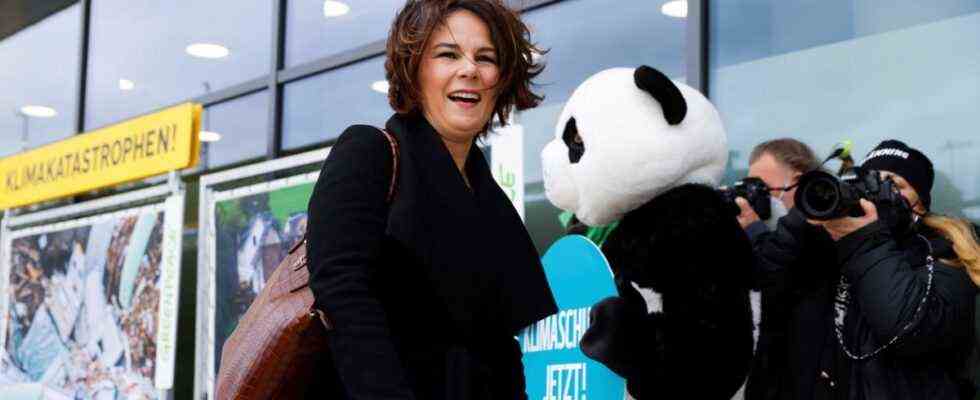It is a parade of confidence, there is heart, sometimes kissing. A Social Democrat falls around the neck of a Green MP as if she had missed him for a long time. “Stormy,” said the Greens chairman Annalena Baerbock when asked what the situation was like before the start of the coalition negotiations. Perhaps not only the windy weather is meant. And then they come, most of them in a demonstrably good mood.
“We are delighted,” says Justice Minister Christine Lambrecht from the SPD. “It is an important day,” says the Rhineland-Palatinate Prime Minister Malu Dreyer (SPD). The mood of the Green parliamentary group leader Anton Hofreiter is “very good”, while Lower Saxony’s Interior Minister Boris Pistorius (SPD) is “relaxed and full of anticipation”. Maybe he is one of the many here who want to emerge from the negotiations with a new job.
Thursday in front of Hub27, a soulless box on the exhibition grounds far to the west of Berlin. The negotiators who want to negotiate a coalition agreement for a traffic light government arrive here early on Thursday afternoon in just three weeks. The SPD, the Greens and the FDP do not want to hesitate for long.
Before the negotiations begin on Thursday, the general secretaries of the three parties stand in front of three microphones to explain the route. With Volker Wissing, the general secretary of the FDP, it almost sounds as if a troop had come to roll call. “We will demand a lot from the working groups,” he announced. What comes next is “concentrated work, a lot of commitment and presence”.
Olaf Scholz is to be elected as the new chancellor in the week after Nikolaus
The three parties have agreed on an ambitious schedule. The 22 working groups should deliver their results by November 10th, the coalition agreement should be in place at the end of November and Olaf Scholz will be elected Chancellor in the week of December 6th. So far, Scholz had only set the goal of being finished before Christmas. Now, “before Christmas became the St. Nicholas week”, says the Greens federal manager Michael Kellner. “We are all looking forward to it, the mood is good,” promises SPD General Secretary Lars Klingbeil.
With the start of the official coalition negotiations, the talks are now leaving this sheltered and secretive space in which a very small group of top politicians have agreed on an exploratory paper. This circle still exists in the “main negotiating group” around SPD chancellor candidate Scholz, the Greens chairmen Annalena Baerbock and Robert Habeck as well as FDP leader Christian Lindner and his general secretary Wissing. This inner circle, says Klingbeil, should “finalize” the text of the contract and “clarify any remaining areas of conflict”.
Negotiations in the working groups will begin on Wednesday. Whoever is allowed to have a say in what there should also decide on some careers. Christine Lambrecht, the previous Minister of Justice, heads the working group “Internal Security, Civil Rights, Justice, Sport” for the SPD, for example. Does she want to inherit Minister of the Interior Horst Seehofer? Or is it possible that the Interior Minister of Lower Saxony Boris Pistorius comes across? Or someone from the Greens?
Such questions do not yet officially play a role. The personal details should only be negotiated at the end of the negotiations. The idea that possible post allocations are not already considered now would be naive. So it can be significant that, for example, the Greens ex-party leader Cem Özdemir, most recently the transport policy spokesman, will not negotiate about mobility, but about the economy.
KfW is to play an important role in the financing
Such constellations should not be overrated either. The working group arithmetic must above all follow the various rules of proportional representation. In addition to gender equality, consideration must be given to internal party currents and country teams. For example, it is not the omnipresent Karl Lauterbach who heads the important health working group for the SPD, but Katja Pähle from Saxony-Anhalt.
The titles of the working groups range from “Modern State and Democracy” to “Climate, Energy, Transformation” and “Equality, Diversity” to “Finance and Budget”. This working group occupies a special position because it is dedicated to the question: Who should pay for it? Taxes cannot be increased, and the debt brake will not be touched either. The money for the most important future investments must be obtained differently.
The Reconstruction Loan Corporation (KfW) is likely to play a role in making the necessary “huge transformation investments”, as FDP General Secretary Wissing revealed on Thursday morning. You will “use all leeway,” said the Greens federal manager Michael Kellner. There is such leeway through the dismantling of environmentally harmful subsidies and at KfW. At least there seems to be agreement.

